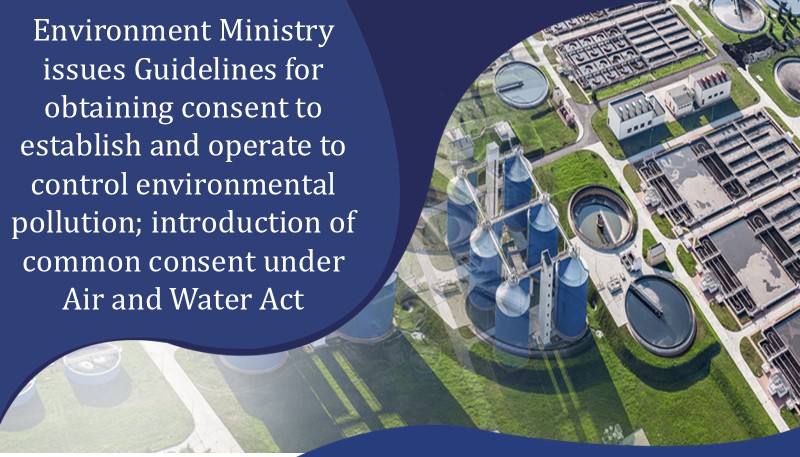Environment Ministry issues Guidelines for obtaining consent to establish and operate to control environmental pollution; introduction of common consent under Air and Water Act

The Ministry of Environment, Forest and Climate Change (“Ministry”) has issued the following Guidelines-
- The Control of Air Pollution (Grant, Refusal or Cancellation of Consent) Guidelines, 2025 under the Air (Prevention and Control of Pollution) Act, 1981 and
- The Control of Water Pollution (Grant, Refusal or Cancellation of Consent) Guidelines, 2025 under the Water (Prevention and Control of Pollution) Act, 1974.
These Guidelines provides the procedures and criteria for obtaining, renewing, and potentially losing consent to establish or operate industrial plants that may cause air and water pollution.
These guidelines aim to streamline the consent process while ensuring environmental protection.
Key Highlights:
- Application Procedure- Applications for consent to establish or operate must be made using specified forms provided in the Guidelines along with the relevant plant details and the required fees. A 5% rebate is offered for operation renewal applications submitted four months before expiry. Late fees apply for delayed renewals.
- Consent Validity- Consent to establish is valid for five years, extendable by up to two years. Consent to operate validity varies by industry categories:
- Red: 5 years;
- Orange: 10 years;
- Green: 15 years;
- Blue: 17 years.
- Fees- Fees for consent will be determined by respective state governments/UT administrations but cannot exceed the limits specified in the Guidelines. Fee increases are capped at 10% and can occur no more than once every two years.
- Common Consent- A single application process is established for consent under the Principal Acts and authorization under the Hazardous and Other Wastes (Management and Transboundary Movement) Rules, 2016, for managing hazardous waste.
- Timelines for Consent- The Guidelines set specific timelines for granting or refusing consent, varying by industry category and type of consent applied for. Failure to decide within the stipulated time results in the application being referred to the State Level Monitoring Committee, which must then decide within 30 days. The Committee will investigate delays and recommend disciplinary actions as needed.
- Location Criteria- The Ministry in the Guidelines specify minimum distances between industrial plants and sensitive areas like water bodies, settlements, educational institutions, and protected areas. These distances vary based on the industry category.
- Grant of Consent to Establish and Consent to Operate- Consent to establish requires compliance with location criteria and other conditions, including the installation and operation of approved pollution control equipment. Consent to operate is granted after the plant is established, and the required pollution control systems are in place and ready to operate. Applications must include compliance reports. Continuous emission monitoring systems are required as applicable.
- Renewal of Consent- Renewal applications must include compliance reports, environmental statements, annual returns (for hazardous waste), and a declaration of no changes in the manufacturing process, capacity, or emissions.
- Refusal and Cancellation of Consent- Consent can be refused or cancelled for various reasons, including non-compliance with location criteria, consent conditions, environmental clearance conditions or for submitting false information. A reasonable opportunity for a hearing will be provided before any refusal or cancellation.
Source: Ministry of Environment, Forest and Climate Change